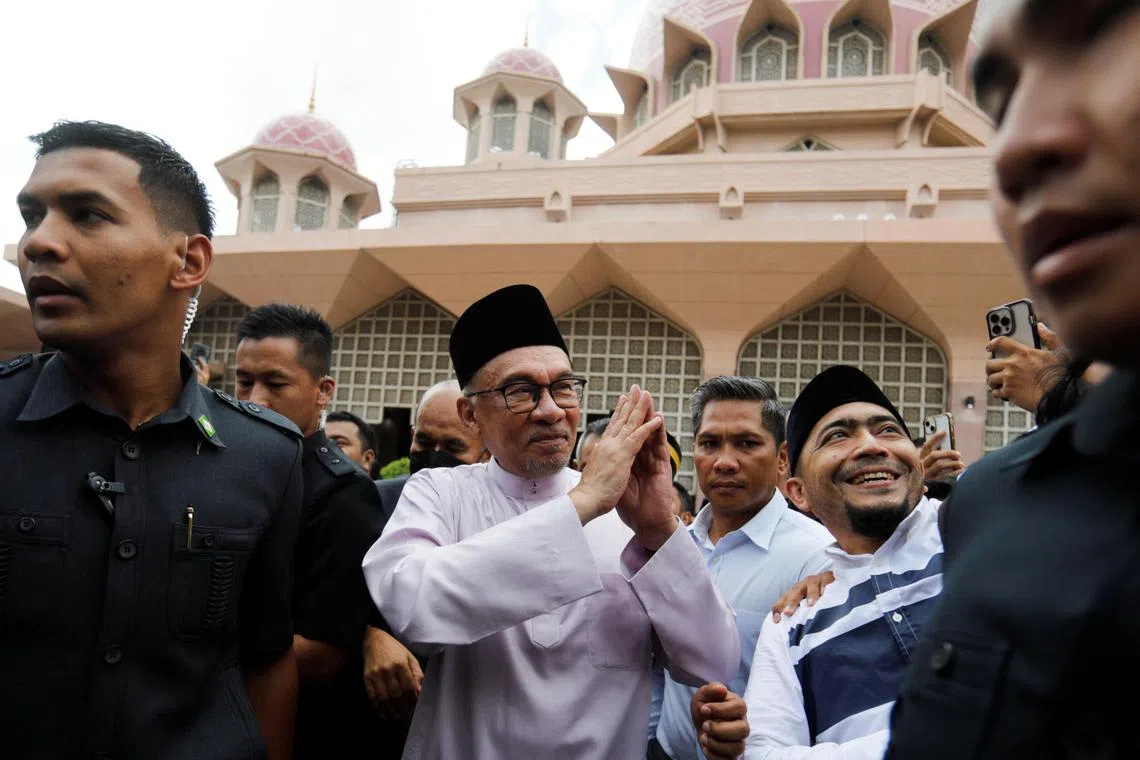Malaysia PM Anwar says Cabinet posts ‘not reward’ for support
Sign up now: Get insights on the biggest stories in Malaysia

Newly installed Malaysian Prime Minister Anwar Ibrahim is largely expected to announce his slate of ministers this week.
PHOTO: REUTERS
PUTRAJAYA – Malaysia Prime Minister Anwar Ibrahim said that his forthcoming Cabinet appointments
Datuk Seri Anwar, who became Malaysia’s 10th prime minister last Thursday,
He is largely expected to announce his slate of ministers this week.
Speaking to the press on Sunday at his office after chairing a council addressing Malaysia’s cost of living issues
Mr Anwar also reiterated his commitment to reduce the Cabinet’s size compared with that of his predecessors Ismail Sabri Yaakob and Muhyiddin Yassin, who both had bloated Cabinets of more than 30 ministers and nearly 40 deputies while trying to maintain a mixed-coalition administration that had a single-digit majority.
“I want them to support me for the policies I bring, my commitment against corruption, and to resuscitate the economy,” the Premier said.
Mr Anwar has 148 MPs in his government bloc representing at least four coalitions, three parties and independent candidates. This gives him a two-thirds majority in the 222-seat Parliament, possibly making it the strongest government in Malaysia since early 2008, when Barisan Nasional (BN) commanded two-thirds of the seats in Parliament.
However, there are concerns that Mr Anwar will need to heed the demands of the multiple parties that prop up his administration – including former arch-rivals BN, Sarawak’s ruling party Gabungan Parti Sarawak (GPS) and Sabah’s ruling Gabungan Rakyat Sabah.
Mr Anwar’s Pakatan Harapan (PH) coalition supplies only 82 of the seats for his government.
He had previously indicated that he would be appointing two deputies – one from BN and one from GPS – which is expected to take place before he faces a vote of confidence in Parliament on Dec 19.
Mr Anwar decided to call for the confidence vote after his rival for the top job, Tan Sri Muhyiddin, who is also Perikatan Nasional chief, questioned his majority claim
BN chief Zahid Hamidi on Sunday gave his assurance that his coalition’s 30 MPs would be fully backing Mr Anwar during the confidence vote.
“This is so that the legitimacy of the PM will be finalised and all those who are questioning it will be silenced,” Zahid said in a statement.
Mr Anwar, who has largely focused on cost-of-living issues
The new Premier said he was aiming to direct money towards low-income groups as he prioritises the rising cost of living amid slowing growth.
Malaysia is estimated to spend a record RM77.7 billion (S$24 billion) in 2022 on subsidies. It offers subsidies to all citizens, with discounted fuel and cooking oil accounting for the biggest expense. Electricity, sugar and flour are also subsidised.
“Subsidies must be targeted, otherwise those subsidies are enjoyed not just by the low-income group but also the wealthy,” Mr Anwar said, adding that other incentives would be considered for industries that no longer benefit from subsidies.
He is carrying through the stance of the previous administration, which in October proposed a smaller Budget, cutting subsidies due to rising commodities costs and the resulting impact on government coffers.
Mr Anwar was made prime minister following five days of negotiations and intrigue after Malaysia’s general election on Nov 19 ended in a hung Parliament



